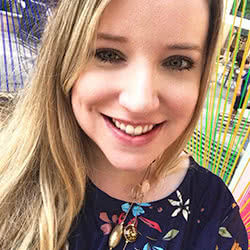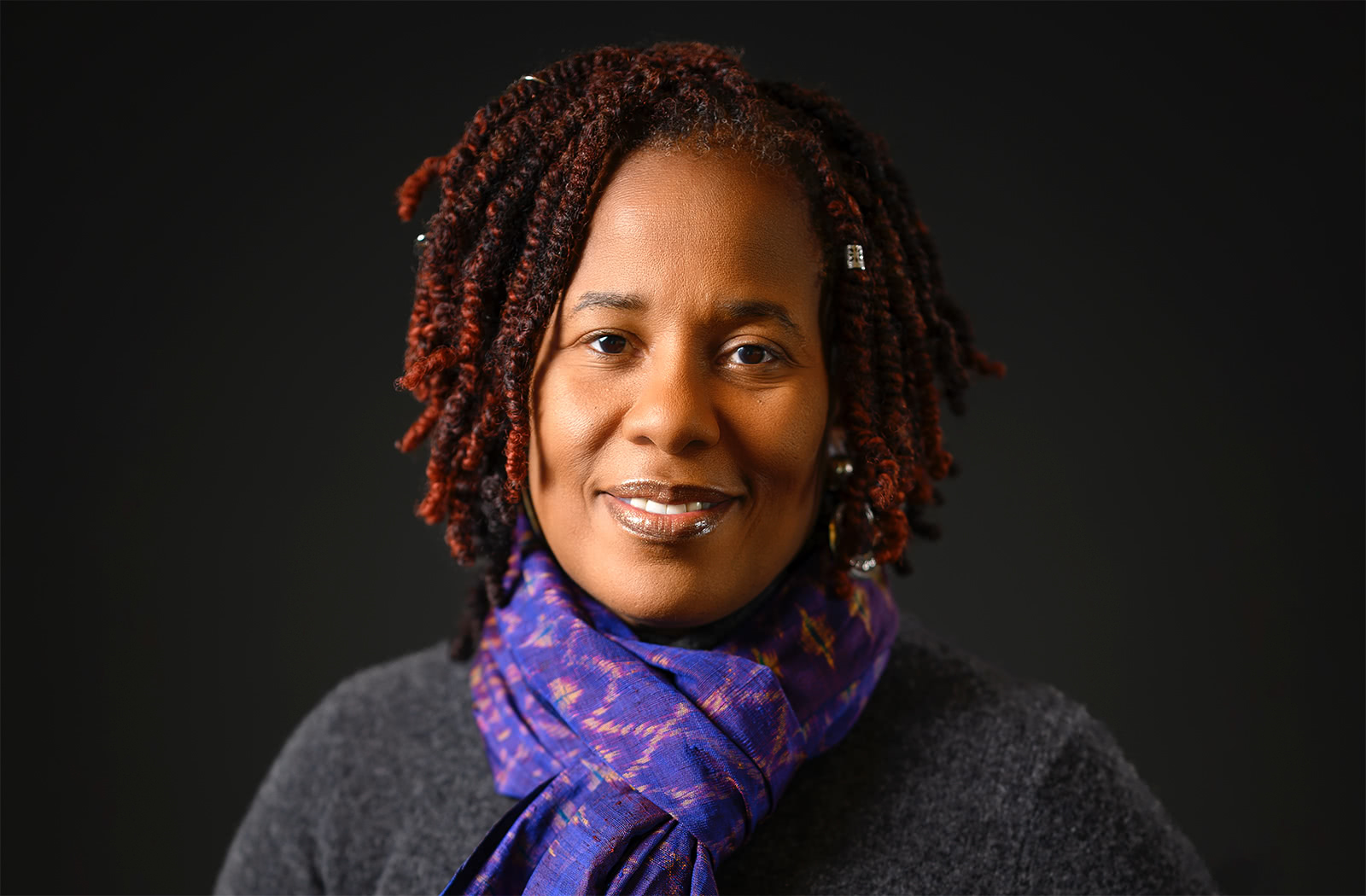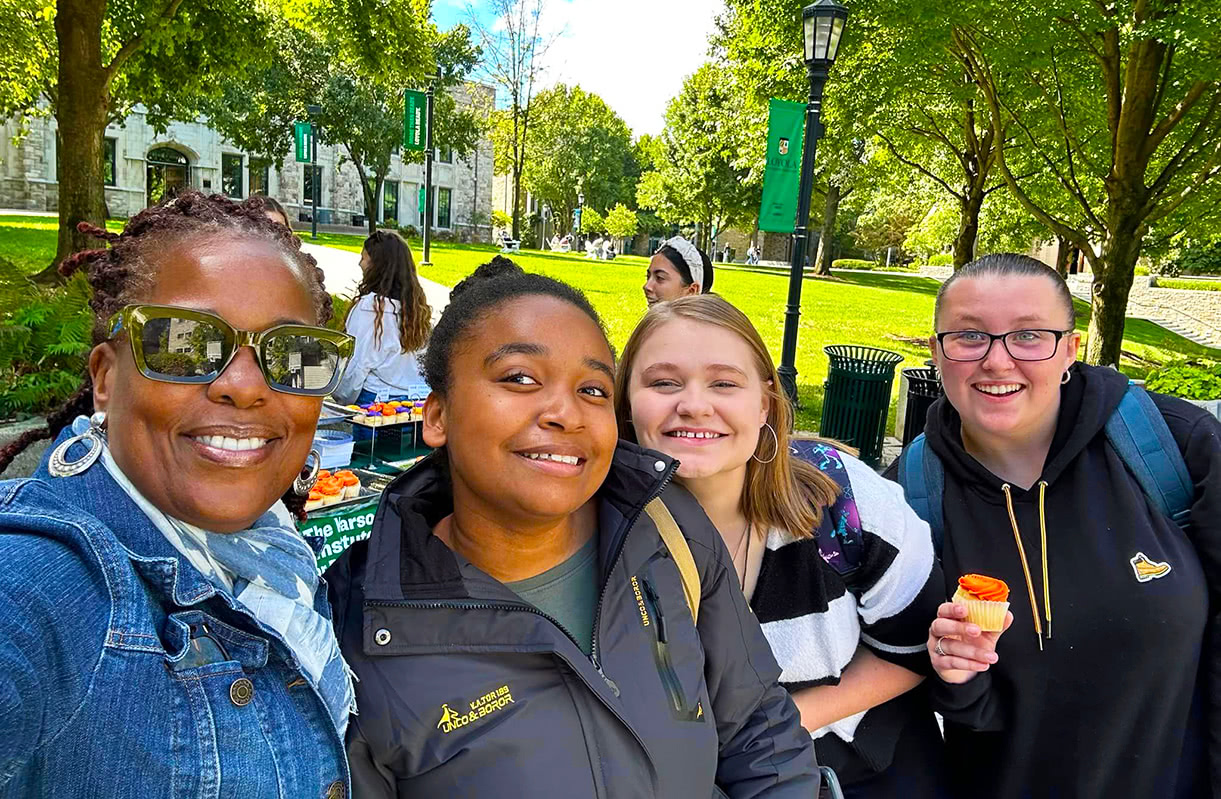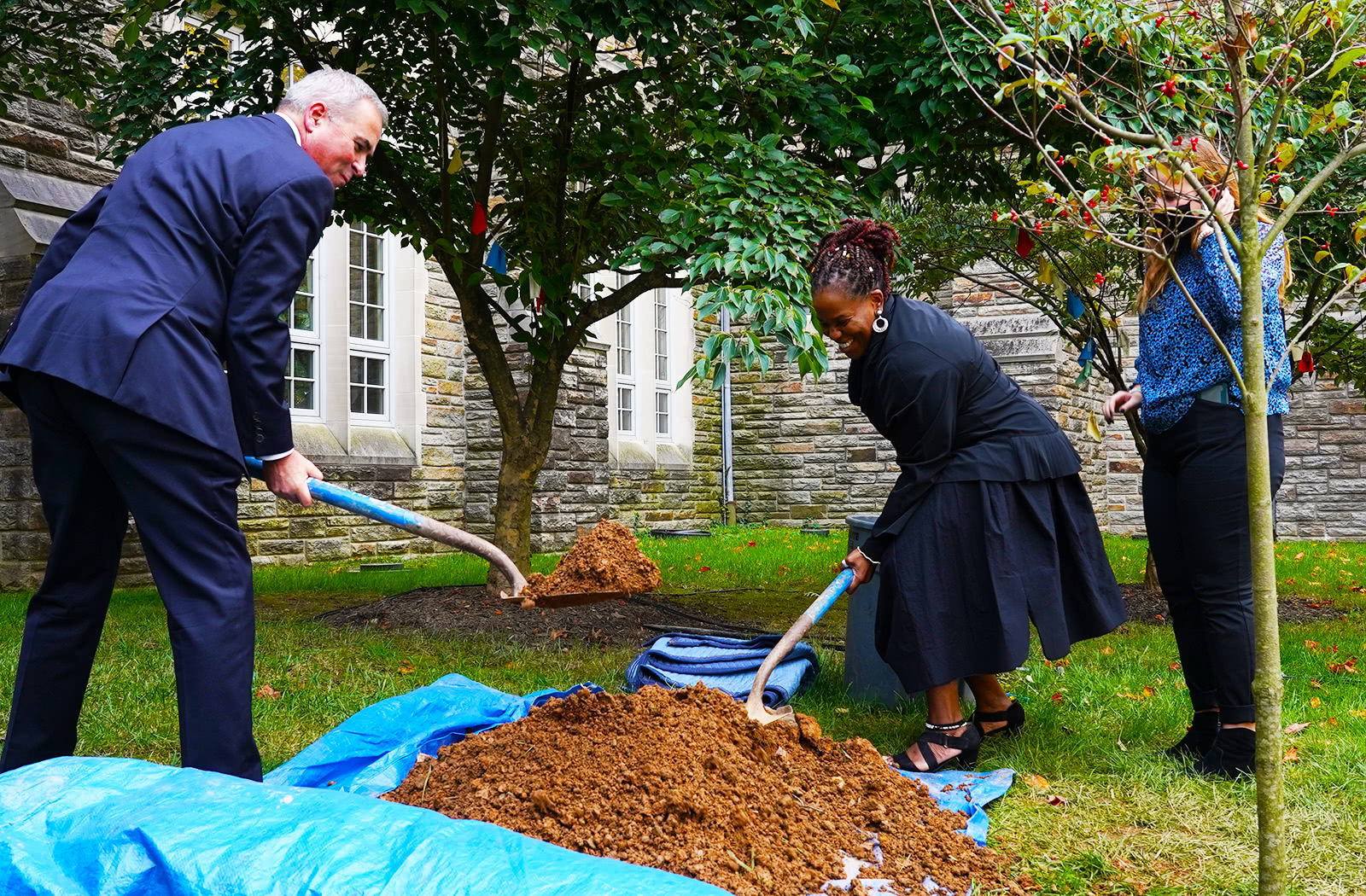
Karson Institute sparks conversations and action toward justice
The Karson Institute for Race, Peace & Social Justice is answering urgent questions about inequality—and empowering a generation of everyday activists
 Claire Hoffman, ’07
Claire Hoffman, ’07
 Photo credit: Christopher Myers.
Photo credit: Christopher Myers.
When Karsonya "Kaye" Wise Whitehead, Ph.D., was launching Loyola’s Karson Institute for Race, Peace & Social Justice two years ago, the professor of communication and African and African American Studies knew she wanted to name it after her father.
Whitehead refers to her father, the Rev. Dr. Carson E. Wise, Sr., as one of the “nameless, faceless foot soldiers” of the civil rights movement, who served as her first social justice teacher. “He’s one of the people who showed up and put in the hard work—but who wasn’t on the stage or in the press,” she explains.
Spotlighting the power of everyday people to change the world is one of Whitehead’s key goals with the Karson Institute, which provides a scholarly space for professors, students, and activists to confront injustice and racial inequity in America. Whitehead—a three-time New York Emmy-nominated documentary filmmaker, award-winning radio host, author, and speaker who has earned several prestigious honors for her scholarly and activist work—serves as its founding director.
The issues we’re talking about, they don’t just impact people of color. They impact everyone and should move all of us to act.
—Karsonya "Kaye" Wise Whitehead, Ph.D.
The Karson Institute officially launched in October 2020, a time when, Whitehead says, “the nation was ready to have that conversation about racial justice.” The country was reeling from both the COVID-19 pandemic and the murders of George Floyd, Breonna Taylor, Ahmaud Arbery, and others, leading to a summer of impassioned Black Lives Matter-related protests.
“I started thinking about what I could do differently,” remembers Whitehead. Since receiving her master’s degree in International Peace Studies from the University of Notre Dame, she’d long had a desire to explore using peace and conflict resolution to talk about inequality. The idea for the Karson Institute was born.
"When Kaye approached the Loyola administration with her vision for the Karson Institute, we were immediately interested in making it happen," said Stephen Fowl, Ph.D., dean of Loyola College of Arts and Sciences. "From my perspective, it was one of those relatively rare occasions when a faculty member’s dreams and the University’s impulses aligned in the right ways at the right time. It was really just up to us to recognize that and act."
 Kaye Whitehead, Ph.D., and students celebrate the second anniversary of the Karson Institute for Race, Peace & Social Justice on campus.
Kaye Whitehead, Ph.D., and students celebrate the second anniversary of the Karson Institute for Race, Peace & Social Justice on campus.
Founding the institute at a primarily white institution was a conscious decision, Whitehead says. “The issues we’re talking about, they don’t just impact people of color. They impact everyone and should move all of us to act,” says Whitehead, a professor and scholar who has taught at Loyola since 2009. “If all of this information and research is only available in environments that predominantly serve communities of color, then things will never change.”
Inspired by her father’s work, Whitehead firmly believes that real change doesn't just come from the leaders of the movements. “Sure, it would be great if I have the next Dr. King or Dr. Dorothy I. Height sitting in my class,” says Whitehead. “But I would be happier for the Karson Institute to be known for empowering those nameless, faceless foot soldiers who take the conversations and work back to their churches, their synagogues, their communities. Because that is how society changes—from individuals doing the hard work every day and not just by the ‘leaders.’”
Rodney Parker, Ph.D., Loyola's chief equity and inclusion officer, believes the Karson Institute is a natural fit for a university like Loyola.
“It is birthed out of our Jesuit, Catholic identity, as well as the mission of the institution. And it just makes sense in the city of Baltimore,” Parker explains. “Loyola’s long history in Baltimore around social justice and the ways in which we have engaged Baltimore City—and the ways in which we need to re-engage the city—are critically important. Having the Karson Institute situated here helps us to do that.”

More than Racial Justice – A Look at The Karson Institute’s Three Centers
The institute currently has three active centers, each with a different approach. It has always been important to Whitehead to focus on more than just racial justice. “We also talk about economic injustice, environmental injustice, and gender injustice—and how all of that comes together. We are using Kimberlé Crenshaw’s idea of intersectionality to address these issues,” says Whitehead, also known by many in the Baltimore area as “Dr. Kaye” because of her award-winning daily radio show on the NPR affiliate, WEAA, Today with Dr. Kaye. She also hosts the Karson Institute podcast, Strands of Our Nation.
Building on Whitehead’s work as a public intellectual is the Center for Public Engagement, which hosts monthly, intimate conversations with selected guests, along with podcasts, student-led discussions, a civic responsibility-focused journalism program for local high school students, and more. Since the center’s founding, participants in these conversations have included Anthony Fauci, former chief medical advisor to the U.S. president, and William Ruto, now president of the Republic of Kenya.
It’s a hub where Loyola can really become known for our work around peace, race, and social justice.
—Rodney Parker, M.S. ’11, Ph.D. ’17, Loyola’s chief equity and inclusion officer
Meanwhile, the Center for Research & Culture consists of fellows, research assistants, and students who study the intersection of race, social justice, peace, education, and advocacy movements. One of the center’s senior fellows, Bishop Dr. Van Gayton, is a veteran professor, pastor, and speaker who is researching European colonialism and its roots in racism.
“When George Floyd was killed, that really ignited the flame in me. When I looked up Dr. Kaye and read what the institute was about, I thought it would be great to be a part of a cadre of scholars who are looking for ways of peace yet dealing with the race issue at the same time,” Van Gayton remembers. “My interest in social justice, race relations, and religion just fit the very vision and purpose of the Karson Institute.”
Finally, the Center for Teaching and Learning helps K-12 educators and administrators across the United States prepare for diverse student populations and create professional development materials and resources. Whitehead calls this “a natural extension” of her professional journey, which includes time as a social studies teacher in Baltimore City Public Schools.
Courtney Carroll, ’21, has seen how the three centers allow the institute to reach diverse populations within the Loyola and Baltimore communities. While working as Whitehead’s research assistant, she saw how students at City Neighbors High School, a Baltimore City public charter school, attended the 2021 Peace Symposium and were able to connect with Loyola students and experience a day on a Baltimore college campus.
“The students of Loyola will benefit from the Karson Institute for years to come. Each year we will have more immersive activities, from speeches to celebrations, along with tough conversations about our Loyola community,” says Carroll, who now serves as operations manager for the National Women’s Studies Association.

Dreaming Big for the Future of the Karson Institute
Reflecting on the last two years, Whitehead believes the institute has begun to make its mark. She cites moments of “incredible joy” she’s found from the work—like having her father on Zoom as she launched the institute in his name and when an old acquaintance shared that her son was planning to attend Loyola due to Whitehead’s work.
Whitehead is also conscious that the Karson Institute is tied to her own reputation and connections in Baltimore and beyond—and her priority is that the institute be sustainable beyond her tenure, and that it evolves with the pressing issues of the times. “If I retire in 10 years and Karson stops, then my work has not been done correctly,” she says.
 The Karson Institute for Race, Peace & Social Justice celebrated its one- year anniversary with a series of events, including a tree planting ceremony near the Fernandez Center. Pictured from left: President Terrence M. Sawyer, J.D., and Kaye Whitehead, Ph.D. Photo credit: Christopher Myers.
The Karson Institute for Race, Peace & Social Justice celebrated its one- year anniversary with a series of events, including a tree planting ceremony near the Fernandez Center. Pictured from left: President Terrence M. Sawyer, J.D., and Kaye Whitehead, Ph.D. Photo credit: Christopher Myers.
Parker too has big dreams for the Karson Institute, envisioning it as a premier institute where scholars interested in diversity, equity, inclusion, and justice seek to further their studies. “It’s a hub where Loyola can really become known for our work around peace, race, and social justice, and where students can do internships and gain experience with real-life situations and connections.”
Personally, Parker cannot imagine doing his work without the Karson Institute. “It really does help us synergistically engage both on campus and in the city of Baltimore, and to bring that learning back into the classroom,” he explains.
Whitehead sees the Karson Institute and its scholars as children she’s sending into the future. “I think about a quote from the late congressman Elijah Cummings: ‘Our children are the living messengers we send to a future we will never see.’ So, if in 100 years, the Karson Institute is standing strong as a lighthouse—as a place that has adjusted with how society is moving and is continuing to ask and answer the hard questions—even though I’ll never see it, that’s what success looks like for me. I get excited to think that someday, Baltimore City students will look at the Karson Institute at Loyola and see it as a place where they can study, where they can grow, and where they can find and claim their voice.”